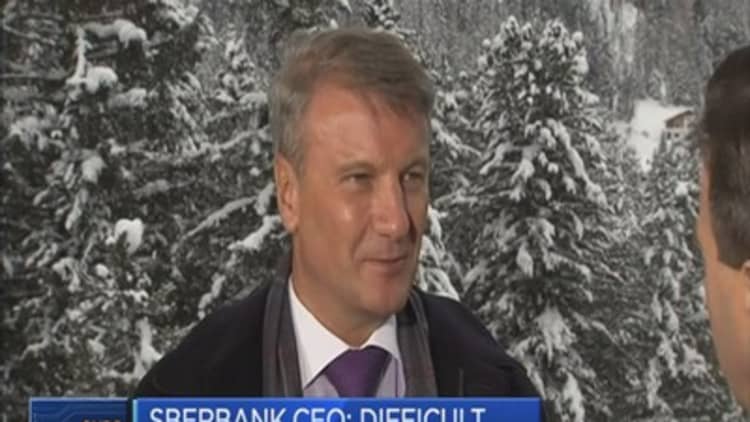


The Russian government is planning to privatize state banking assets but the timing is not so good, the president of VTB Bank, one of Russia's largest lenders, told CNBC on Wednesday.
"I spoke to the prime minister and ministers in the government and they seem to be very much eager to continue privatization but the timing is perhaps not the very best," Andrey Kostin said.
Speaking to CNBC from the World Economic Forum (WEF) in Davos, Kostin said there were a number of reasons why the government was keen to progress with a plan to sell stakes in key state assets.
"They want to do it to get extra cash for the budget and also perhaps ideologically they want to continue the program of privatization.
As Russia's recession continues against a backdrop of low oil prices and lower oil revenues for the state, there has been talk at the highest levels that the Kremlin could consider selling stakes in state banking assets such as VTB and fellow partly state-owned counterpart, Sberbank.
The Russian state owns a majority 60.9 percent stake in the second-largest Russian banking group VTB and holds 50 percent of the share capital plus one voting share in Russia's largest lender Sberbank.
VTB's Kostin said the government could sell up to a 10 percent stake in VTB within existing laws "or they could go beyond (that)."
"I don't think it will change anything if the government sells 10 percent but if they go further and the government stake is below 50 percent it might change something I'm prepared to work with any shareholders."
"Of course, it's up to the government to decide when is the best time to sell but the timing is difficult particularly with the sanctions, oil prices and general economic situation," Kostin added.
The chief executive of Sberbank, Herman Gref, told CNBC on Wednesday that it could take a year to prepare the ground for privatization.
"I think that we can speak about privatization at the end of this year or next year, but not earlier...Now is the right time for privatization but we must wait for market stabilization first," he said.
That Russia could consider selling stakes in some of the country's largest lenders reflects the tough times in which the country currently finds itself.
Russia entered recession in 2015, an event that followed the dramatic decline in oil prices (Russia is a major oil producer) as well as international sanctions imposed on it for its annexation of Crimea in March 2014 and role in the pro-Russian uprising in Ukraine in the same year.
On Tuesday, the International Monetary Fund (IMF) cut its growth forecast for Russia in 2016, predicting that the economy would contract by 1 percent, worse than the 0.6 percent contraction predicted by the IMF in October.
Concerns over Russia have manifested themselves in Russian markets which have continued to experience tumult since the start of the year. The ruble has also continued its slide against the dollar, falling a further 8 percent since the start of the year to currently trade around 81 rubles to the dollar.
Gref believed that market turmoil could continue – particularly given uncertainty over oil prices.
"I think that this volatility could be seen until the end of the year," he said. "But it's too difficult to predict the oil price but i think this is why wee're seeing such big volatility."
He said that concerns over a slowdown in China, which has prompted global market ructions too, was also a factor in Russian turbulence.
"I think that China has some macro-economic problems," he said, "but i hope that towards the end of the year the situation can be more stable."







